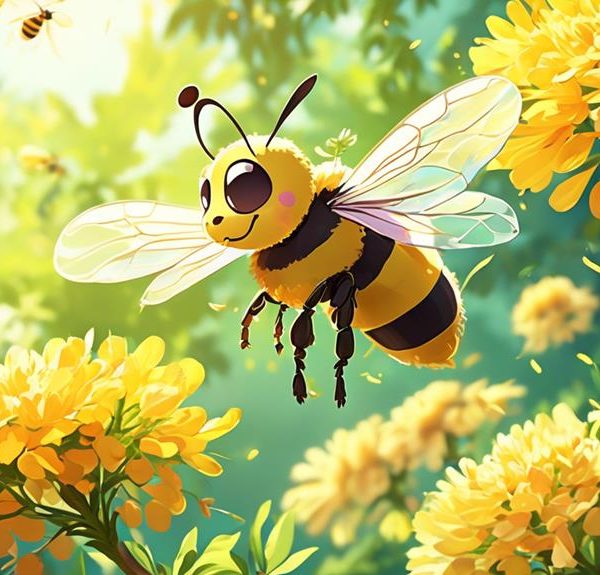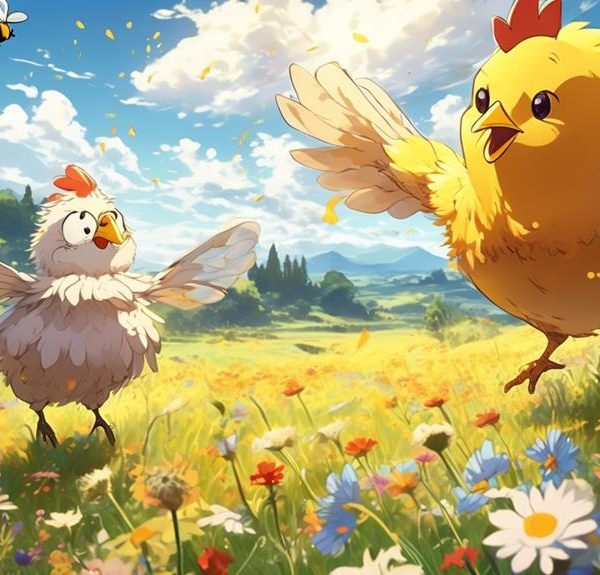Get a buzz with our surprising exploration into whether bees have a taste for your leftover coffee grounds.
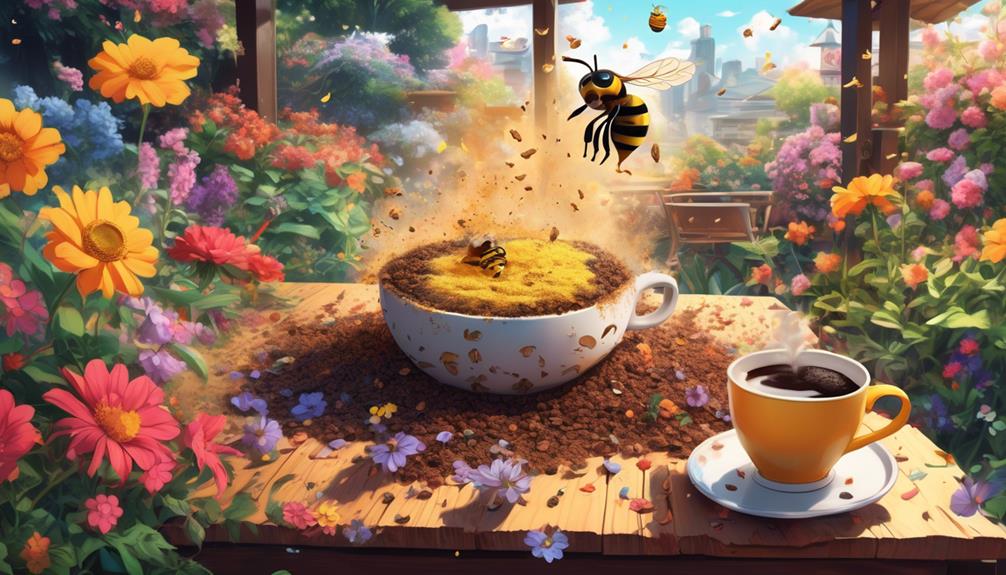
Do Bees Like Coffee Grounds?
Just when you thought your morning coffee ritual was a private affair, think again; our buzzing friends, the bees, may also have an interest in your discarded coffee grounds.
You've probably never considered whether bees, like you, have any affinity for the aromatic remnants of your daily brew. It's an odd question, isn't it? However, from a scientific standpoint, the potential interaction between bees and coffee grounds is worth examining.
By exploring this topic, you'll not only gain a unique perspective on bee behavior, but you might also discover a novel way to contribute to their survival. Intriguing, wouldn't you say?
Let's take a closer look.
Key Takeaways
- Bees are primarily attracted to strong, sweet smells and specific colors like blue and violet.
- Coffee grounds have a strong scent, but it is not sweet and visually appealing to bees.
- Coffee grounds contain essential nutrients like nitrogen and can deter pests like ants and slugs.
- The use of coffee grounds can have both positive and negative effects on bees, including enhancing their memory and foraging efficiency but also potentially impacting their diet and the diversity of nectar sources.
Understanding Bees and Their Preferences
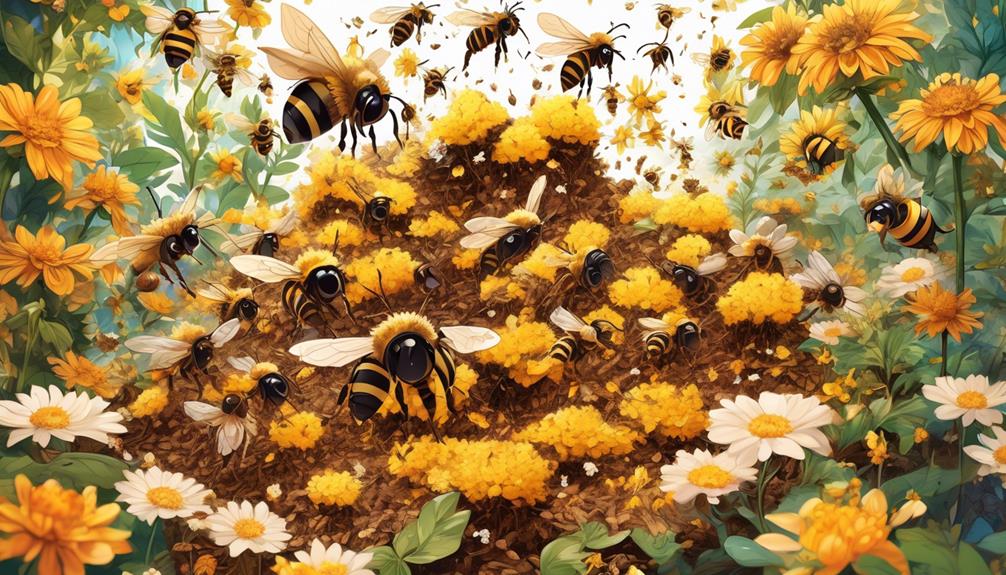
To fully comprehend bees and their preferences, you need to delve into their intricate world, studying not only their behavioral patterns but also their attraction to various substances, including potentially, coffee grounds. The first step is to understand that bees are driven primarily by their sense of smell. They're attracted to strong, sweet smells, which is why they're often seen buzzing around flowers. It's a survival instinct, as they rely on nectar for sustenance.
However, it's not just about the sweetness. Bees are also drawn to specific colors, particularly those on the blue and violet spectrum. This isn't random. These colors stand out against the greenery of plants, increasing the chances of bees locating the flowers.
Now, when it comes to coffee grounds, it's a bit more complicated. Coffee grounds have a strong, distinct scent, but it's not sweet. Moreover, they're not visually appealing to bees. So, while bees might investigate due to the potent smell, it's unlikely they'll stick around.
Still, more research is needed to definitively conclude whether or not bees have a preference for coffee grounds.
The Science Behind Coffee Grounds
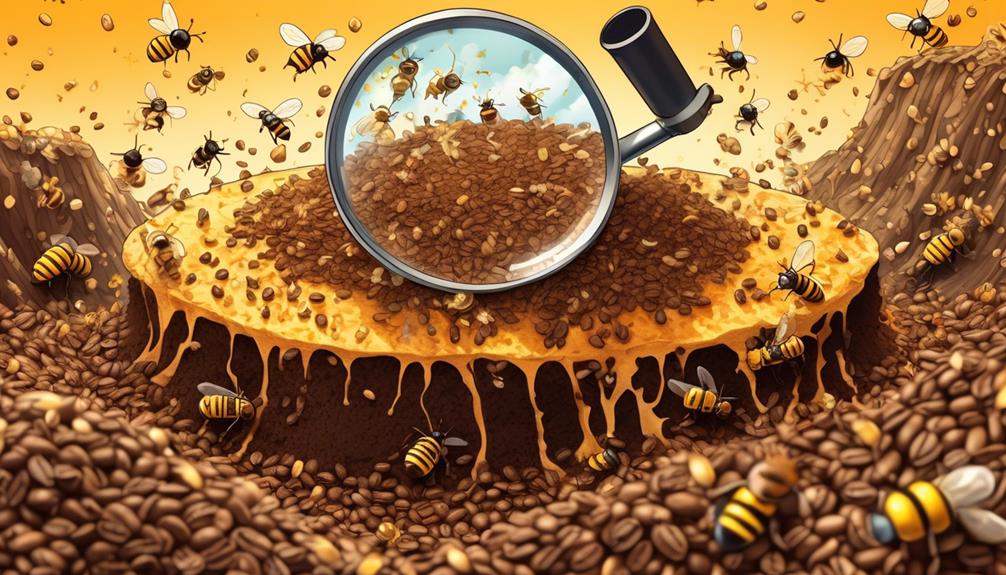
Shifting our focus from bees to the coffee grounds they might interact with, let's explore the scientific properties that define this unique substance.
Coffee grounds are packed full of organic matter, and they're rich in nitrogen, a nutrient essential for plant growth. However, it's not just about the nutrients.
The pH level of coffee grounds usually falls between 6.5 and 6.8, a range that's acidic but not overly so. This acidity can be beneficial for certain types of soil and plants, but it's not universally loved by all flora – hence, some caution is needed when using them as a soil amendment.
Moreover, coffee grounds contain caffeine, a substance that can deter certain insects and pests. This might seem beneficial but remember, not all insects are harmful. Some, like bees, are essential for pollination. So, if caffeine affects bees negatively, coffee grounds could potentially disrupt your garden's ecosystem.
Lastly, when coffee grounds decompose, they release compounds that can inhibit the growth of some plants. So, while they might seem like a promising organic fertilizer at first glance, their use requires some careful consideration and understanding.
Potential Benefits for Bees
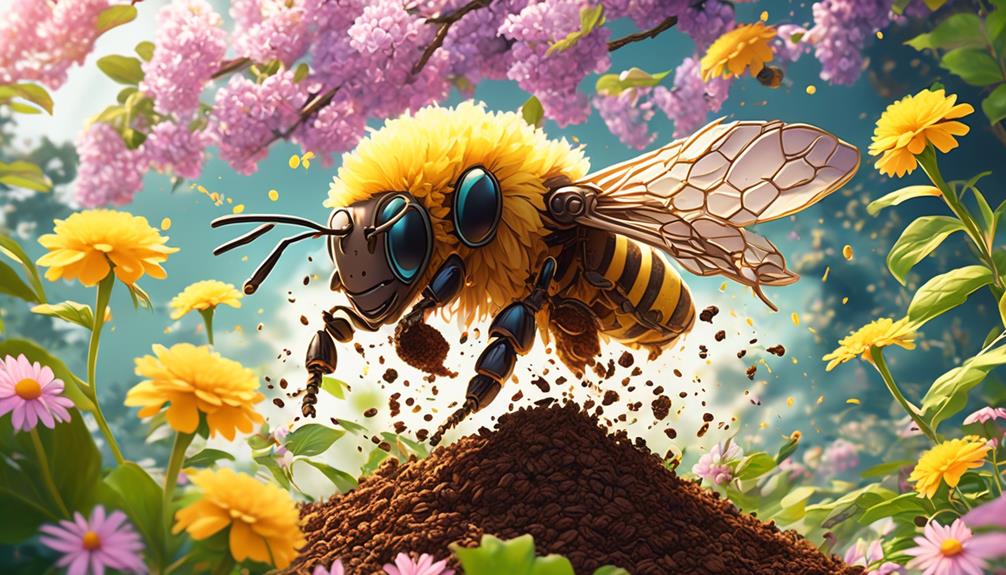
Diving into the potential benefits for bees, you might wonder how these busy pollinators could interact positively with coffee grounds. It's fascinating to think that the remnants of your morning coffee could serve a purpose in the grand scheme of bee life.
Potential Benefit | Explanation |
|---|---|
Nutrient-rich soil | Coffee grounds contain essential nutrients like nitrogen, which can enrich garden soil and promote plant health – a boon for bees. |
Pest deterrent | Coffee grounds can deter pests like ants and slugs that can harm bees. |
Aiding in pollination | Coffee's caffeine can enhance a bee's memory and ability to find flowers, aiding in pollination. |
Potential food source | Some studies suggest bees may actually consume coffee grounds, although more research is needed. |
Environmental recycling | Using coffee grounds in your garden reduces waste, promoting a healthier environment for bees. |
Drawbacks of Using Coffee Grounds
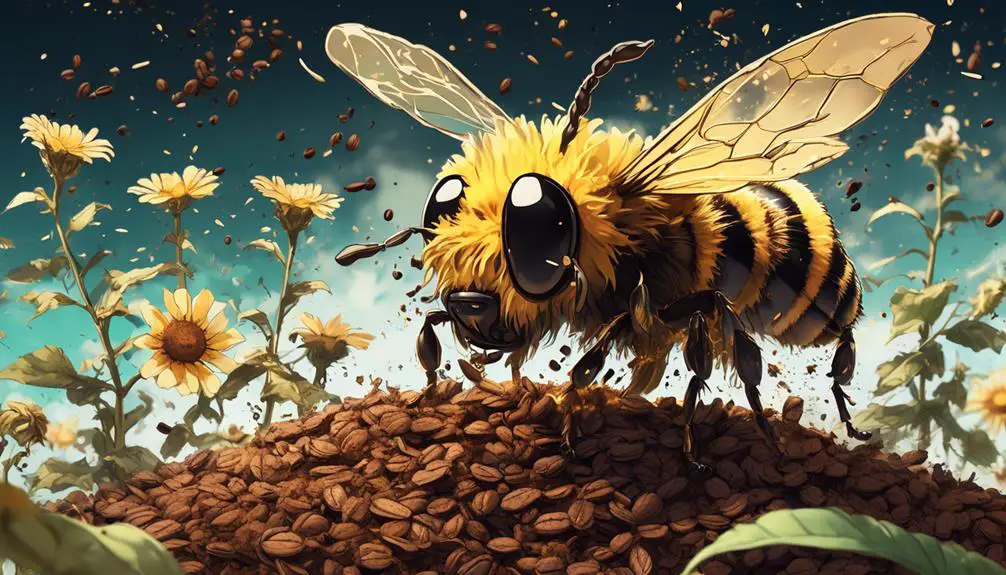
While coffee grounds can offer several benefits for bees, there are also notable drawbacks that need to be considered before sprinkling your leftover brew into the garden. The primary concern is the caffeine content in coffee grounds. It's well-documented that excessive caffeine can have negative effects on bees' foraging behavior and memory, impairing their ability to locate nectar and return to the hive.
Moreover, coffee grounds alter the pH levels of the soil. This may disrupt the balance of nutrients, potentially affecting the growth of plants that bees rely on for food. Remember, not all plants thrive in acidic soil, and a drastic change can lead to a decrease in the diversity of nectar sources, directly impacting the bees' diet.
Real-world Observations and Studies
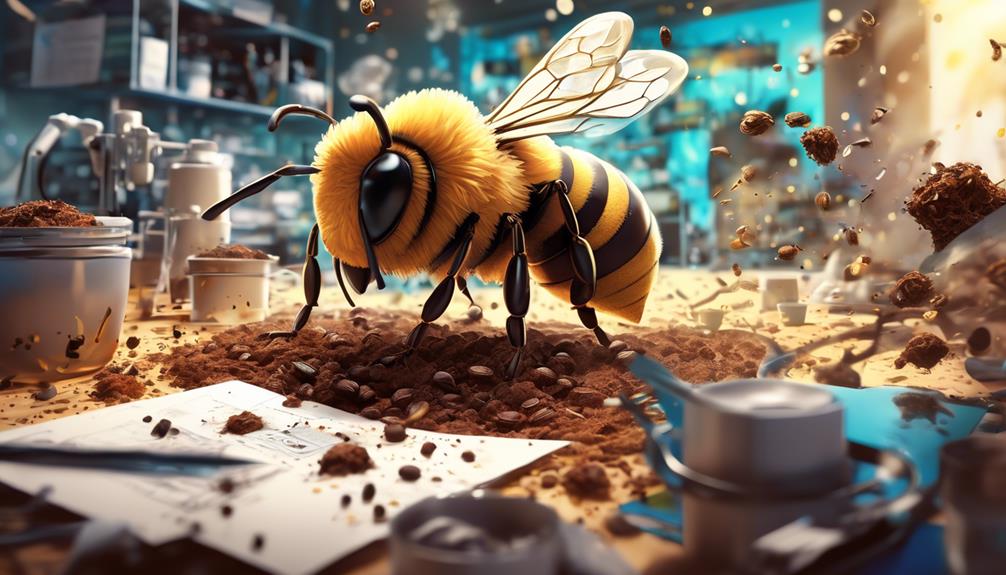
Despite these potential drawbacks, numerous real-world observations and scientific studies have explored the interaction between bees and coffee grounds, providing valuable insights into their relationship.
You'd find it fascinating that some beekeepers actually report that their bees exhibit an affinity for coffee grounds. They've noticed that when coffee grounds are used in compost or spread around plants, bees seem to be attracted to the area. However, this isn't a universal experience and more scientific investigation is needed to understand why this might be the case.
In a study published in Current Biology, scientists found that caffeine, which is naturally present in coffee grounds, can improve a bee's memory and ability to learn. In turn, this can enhance their foraging efficiency and increase pollination. But remember, this doesn't mean that caffeine is entirely beneficial for bees. High concentrations can be harmful, so moderation is key.
It's crucial to note that while these observations and studies provide interesting insights, they don't offer a definitive answer. There's a need for more research to fully understand the effects of coffee grounds on bees.
Practical Tips for Using Coffee Grounds

If you're considering using coffee grounds in your garden as a potential bee attractant, it's important to do so in a way that is beneficial for both the bees and your plants. Here are some practical tips:
- Don't use too much. Coffee grounds are rich in nitrogen, which is great for plants in moderation. However, too much can harm your plants, so use sparingly.
- Mix with compost. To avoid overloading your plants with nitrogen, mix your coffee grounds with compost before applying to soil. This also helps to improve the texture and fertility of your soil.
- Avoid direct contact with plant stems. Coffee grounds can create a barrier that prevents moisture and air from reaching your plants' roots. Always ensure you're applying the grounds away from the base of your plants.
Here's a handy table to remember these points:
Tips | Why | How |
|---|---|---|
Don't use too much | Too much nitrogen can harm plants | Use sparingly |
Mix with compost | Improves soil texture and fertility | Mix before applying |
Avoid direct contact | Prevents moisture and air from reaching roots | Apply away from plant base |
Frequently Asked Questions
Do Other Insects Apart From Bees Get Attracted to Coffee Grounds?
Yes, other insects are indeed attracted to coffee grounds. It's not just bees. Coffee grounds can lure earthworms, which are beneficial for garden soil. However, they're not appealing to all insects.
For example, pests like slugs and snails are actually repelled by them. So, while you're attracting some beneficial bugs, you're also keeping some pests at bay. It's a bit of a mixed bag when it comes to insects and coffee grounds.
Can Beekeepers Use Coffee Grounds to Enhance Honey Production?
As a beekeeper, you can experiment with coffee grounds to see if they enhance honey production. However, there's no definitive scientific evidence supporting this.
While some insects are attracted to coffee grounds, bees don't necessarily have the same attraction. It's crucial to remember that the health of your bees should come first.
Are There Specific Types of Coffee Grounds Bees Prefer More Than Others?
You're inquiring if certain coffee grounds are more appealing to bees.
While bees are attracted to caffeine, they don't have a definitive preference for specific types. However, it's crucial to note that too much caffeine can be harmful to bees.
They're not discerning between grounds; what they're after is the caffeine. So, while your coffee habit might help lure them in, it's not making a gourmet meal for our bee friends.
Is There Any Potential Harm to Humans if Bees Consume Coffee Grounds?
No, there's no harm to humans if bees consume coffee grounds. Bees process and extract nutrients from the grounds, not the caffeine. So, it won't affect their honey production or your consumption of it.
However, not all bees can digest coffee grounds, and it could potentially harm their health. It's best to provide bees with their natural diet to ensure their wellbeing and the continued production of healthy honey.
What Other Household Waste Can Be Beneficial for Bees Apart From Coffee Grounds?
You'd be surprised to learn that bees can also benefit from other household waste. Fruit and vegetable peels, particularly from sweet fruits like apples, can attract bees with their sugary scent.
Used tea leaves can also provide nutrients. However, always ensure you're not exposing the bees to harmful substances. Anything with high sugar content is generally safe as long as it's not mixed with chemicals or substances toxic to bees.
Conclusion
In conclusion, bees don't particularly fancy coffee grounds. However, certain benefits, like deterring pests, can indirectly aid in their survival.
Yet, drawbacks such as potential acidity issues exist. Observations and studies are sparse, so more research is needed.
If you're considering coffee grounds, use them sparingly and monitor your bees closely. Remember, a balanced environment is key for your bees' well-being.

